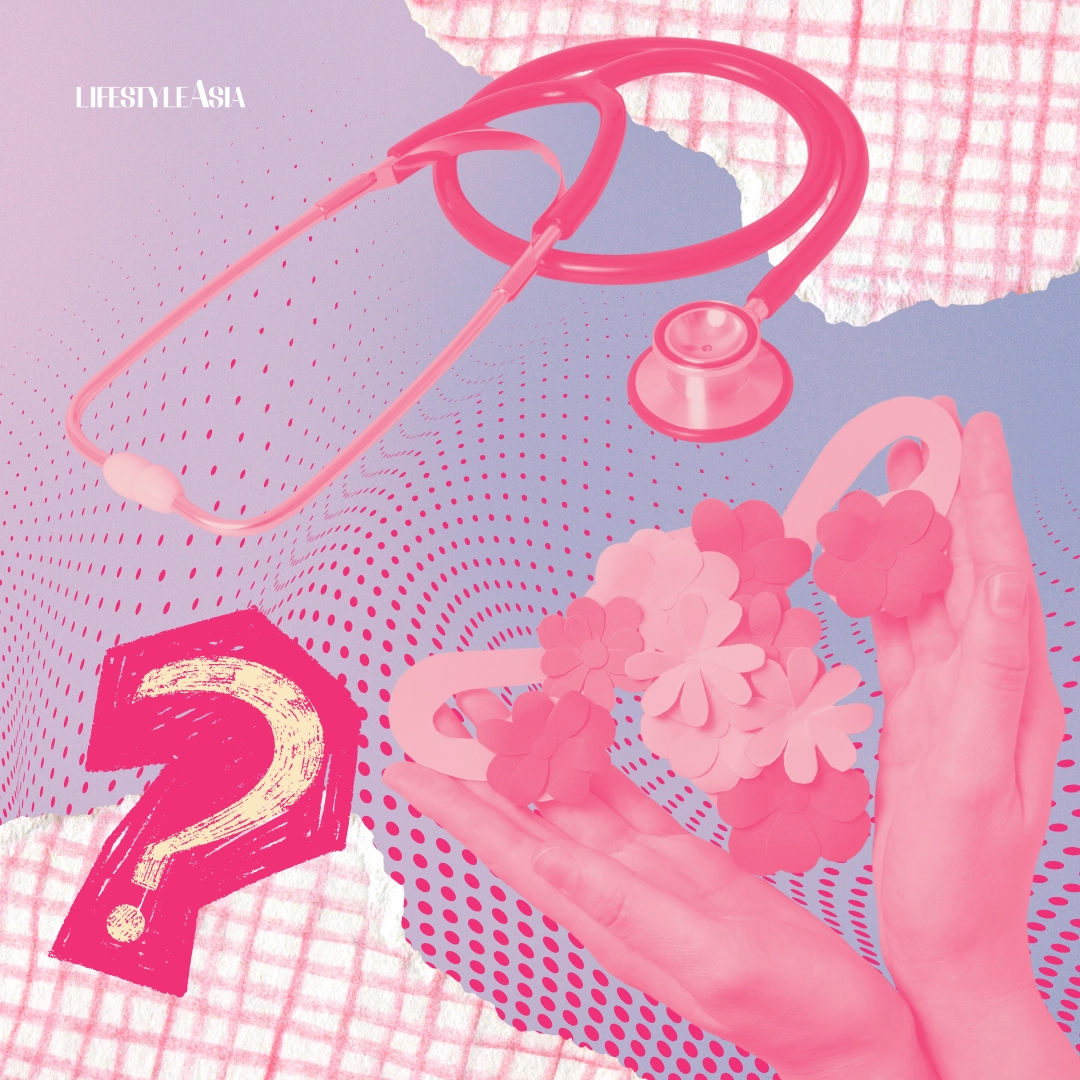Tired? Bloated? Breaking out and skipping periods? Polycystic Ovary Syndrome (a.k.a. PCOS) is more common than you think. And it might be hiding in your body without you even knowing.
“You should probably get checked for PCOS,” a close friend says after I mention my hair’s been falling out lately. She was diagnosed with Polycystic Ovary Syndrome recently, and not long after, I learned two other friends had it too.
“It’s probably just stress,” I say, half-convincing myself.
“Maybe,” she replies. “But it could also be PCOS.”
Fair enough. PCOS: four letters, but a whole lot of problems. More friends began throwing the word around in conversations. Strangers I’d meet would mention it too. I was sensing the health issue, specific to people assigned female at birth (AFAB), was a lot more common than I initially thought.
The easiest thing to do would be to consult Dr. Google or ChatGPT—but since we all value facts from actual experts on the matter (a gentle reminder to avoid getting a health diagnosis from a set of codes), we won’t be doing that.
Instead, we’re seeking insights from obstetrician-gynecologist Dr. Mary Abigail Ty-Roque (Dr. Abby, for short), whose experience in women’s health will hopefully encourage everyone (this writer included) to better understand a disorder that may be hiding in plain sight.

READ ALSO: LA Asks An Expert: Are Veneers Worth It?
What’s Up, Doc? PCOS, Explained.
Could you give a brief definition of PCOS for our readers?
Dr. Abby: PCOS means Polycystic Ovarian [or Ovary] Syndrome. With it being a ‘syndrome,’ it has to have a certain number of symptoms for it to be classified as such.
If we’re going to be strict about it, we follow the Rotterdam criteria wherein you need [to have] two out of its three symptoms for it to be considered a syndrome. Those three different symptoms may be irregular periods, meaning they don’t occur monthly; signs of hyperandrogynism, or in simple terms, when you may have excessive hair growth or acne breakouts; and lastly, an ultrasound finding of your ovaries being polycystic [meaning the ovary contains a lot of cysts].
In a normally functioning ovary, without the hormonal imbalance brought about by PCOS, the ovaries would have around two to four small follicular cysts. But polycystic ovaries have more than 20 small cysts, measuring less than 10 millimeters. If you can imagine, that’s quite a lot. Though it’s definitely not the type of cyst that needs to be removed or operated on.
It’s not limited to or subclassified to just the right or left parts of the ovary. As long as either part of the ovary is seen as polycystic, it’s already diagnosed as such.
What are the common symptoms or warning signs of PCOS that should warrant a visit to the doctor?
Dr. Abby: Usually, patients come in and present us with irregular periods, meaning they don’t come monthly. When we say ‘regular’ periods, it doesn’t mean that they happen on the same date every month. While that may be the case for some patients, it’s still regular even if it falls on the fifth of one month, then the seventh, eighth, and second day of the following months; but eyeballing the dates, they should come in regularly.
When we say your period is irregular, it doesn’t come monthly—some may have it every other month, while some can have intervals for as long as three to six months. For patients who are used to this, it’s normal for them. But really, when they come in and tell us these intervals, it’s a red flag for us, because their periods aren’t coming in regularly.
Apart from irregular periods, patients can also come in complaining of sudden acne breakouts. They have baseline good skin with no problems, but suddenly they get certain breakouts. Some may also complain of weight gain without changing their eating habits. Or they’re still maintaining their active lifestyle, but are unintentionally gaining weight; or they’re in the process of trying to lose weight, but they’re having difficulty doing that.
Other non-typical complaints, or those accompanying these symptoms, some even report fatigue or unexplained fatigue; mood fluctuations; and hair thinning or excessive hair loss. Those can still fall under the spectrum of polycystic ovaries.

What are the usual treatments or steps involved in alleviating PCOS?
Dr. Abby: It would depend on their presenting symptoms, but the first step is definitely for the patient to acknowledge their symptoms. Because once they do, that’s what drives them to seek consultation and know what’s up. When I see patients, I already credit that first step: showing up to the doctor to help them address their problems.
Depending on the symptoms, we’ll work around that. Usually, it’s a combination of giving them oral contraceptive (birth control) pills, and supplements that would help counteract the insulin-resistance component [wherein the body’s cells cannot respond to the insulin hormone, which regulates blood sugar] of the polycystic ovaries. For some, we’ll give anti-oxidant supplements as well, because that can hasten the weight loss process, if part of the problem is excessive weight gain or obesity.
The other part, which is non-medicated, is mainly on the patient’s side: a proper diet and an active lifestyle. Even if they take these medications, when they’re not compliant or the discipline is gone, the treatment becomes useless.
That diet and exercise are equally important because the long-term goal is for them not to be on any form of medication, and to adopt a lifestyle that would help them control PCOS. As frustrating as it may be, there’s no cure for it. It’s not like a UTI or a viral infection, where you take antibiotics for a week and you’re fine. With PCOS, there’s no such thing as a cure—we wish it were that easy. Since it’s a hormonal problem, we have to treat the whole thing holistically.
What are the possible health concerns that could arise if the syndrome is left unchecked?
Dr. Abby: We have to acknowledge that PCOS in itself already predisposes someone to develop complications. If it goes untreated, there are three main systems that can get involved.
First, reproductive-wise, it may lead to problems of fertility. Or if they should get pregnant, it may cause pregnancy complications, as they could develop gestational diabetes mellitus [a form of diabetes that develops during pregnancy and poses risks to both mother and fetus].
For those who have no plans for getting pregnant, they may develop endometrial cancer, or a malignancy within the lining of the uterus. These are complications not brought about by the insulin resistance, but hormonal imbalance—primarily the unopposed estrogen component.
For metabolic concerns, it predisposes a patient to develop type II diabetes. It’s not technically inherited, but if you have a strong family history of diabetes, your risk may be higher. It may also cause a patient to develop hypertension, cardiac diseases, and worst-case scenario, obesity and metabolic syndrome. Those are already complications I’ve seen in other patients in their early 20s. When that’s the case, I have to work with an endocrinologist to help manage their problems.
Psychologically, patients could also experience anxiety and depression, especially with body image issues that arise if they become obese and experience these other health conditions.

Are there ways to prevent PCOS, or is it really something you inherit?
Dr. Abby: There is no form of prevention like a vaccine or medication. But as long as you try to live a healthy lifestyle—meaning you’re watchful of the food you take, and are relatively active, that may help, it might play a role in preventing you from developing PCOS.
Some say that it may be genetically inherited, but there’s still no clear-cut proof, so we can’t necessarily say that. Should it run in the family—let’s say your sister, mother, or cousin has it—it may be coincidental or it may be inherited, we don’t have hard proof just yet.
From your experience, is PCOS really a prevalent health issue?
Dr. Abby: Yes. Actually, it’s among the top three cases I see in the clinics. Patients would come in, and I’d consider PCOS—then we get to confirm the diagnosis, so it’s really prevalent.
Do you think the condition is being widely talked about today?
Dr. Abby: As of recent times, women are becoming more aware of it. I think that’s why more people are getting diagnosed. Five or ten years ago, most women would just stay quiet and assume they’re okay or it’s just a hormonal imbalance.
Nowadays, I see patients who come in, and they don’t necessarily have the classic symptoms or the slightest suspicion that they have PCOS. But their specific concern is, ‘I just want to know if I have PCOS or not, because I have a friend or family member who was diagnosed recently, so I want to be sure I don’t have it.’ The good thing now is that people are more aware of the condition, so that makes them more proactive when it comes to checking earlier.
Now That I Know This, What’s Next?
Dr. Abby: For the ovary havers now armed with this useful information, the first step is the most vital: when in doubt, it’s always worth scheduling a checkup. Understandably, broaching the topic can be an intimidating endeavor for some, given the intimate nature of PCOS. But we shouldn’t have to wait for things to get worse or manifest before taking action—that’s not what proper healthcare is about.
“For people who are scared to seek a consultation, what’s important is for them to find a doctor who fits their needs and matches their vibe,” Dr. Abby advises.
Sometimes, all it takes is finding a welcoming healthcare professional who’ll listen without judgment or dismissal, while clearly explaining the things you need to know. “When fear [from the patient’s side] gets in the way, things can get lost in translation,” the doctor adds.
Clinics like Kindred, which specializes in women’s health, have made this process of searching for proper care more accessible than ever. Dr. Abby also uses her own social media platforms to educate and raise more awareness about the nature of her field.
“I’ve encountered patients who believe what they saw or read on the internet, and somehow it gets perpetuated. That’s where the root of my advocacy on women’s health comes from,” she shares.
If there are guys reading this (a gold star for caring about women’s health), you can do your part by simply learning what you can about PCOS, spreading the word, and encouraging your loved ones to have themselves checked.
As for me? A best friend suggested we go for a joint checkup (the most authentic form of bonding time)—and I’ll be taking her up on that offer.
If you suspect you might have PCOS, or just want to have yourself checked, don’t hesitate to get in touch with a healthcare professional.
Dr. Abby Roque is currently practicing at Providence Hospital, Fe Del Mundo Medical Center, and Kindred Vertis North. Those interested in booking an appointment with her may do so through this link; she can also be found on Instagram and TikTok.





